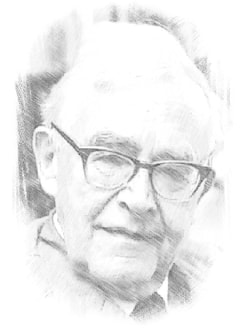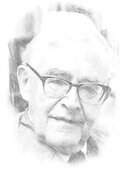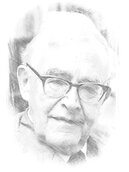Karl barth |
- Wikipedia -
|

Karl Barth German; (May 10, 1886-December 10, 1968) was a Swiss Reformed theologian. Barth is best known for his commentary The Epistle to the Romans, his involvement in the Confessing Church, including his authorship (except for a single phrase) of the Barmen Declaration, and especially his unfinished multi-volume theological summa the Church Dogmatics (published between 1932–1967). Barth's influence expanded well beyond the academic realm to mainstream culture, leading him to be featured on the cover of Time on 20 April 1962. His pastoral career began in the rural Swiss town of Safenwil, where he was known as the "Red Pastor from Safenwil". There he became increasingly disillusioned with the liberal Christianity in which he had been trained. This led him to write the first edition of his The Epistle to the Romans (a.k.a. Romans I), published in 1919, in which he resolved to read the New Testament differently. On April 20, 1962: Barth was featured on the cover of the of Time magazine, an indication that his influence had reached out of academic and ecclesiastical circles and into mainstream American religious culture.(Source: Wikipedia)
 Karl Barth
Karl Barth
“Faith is not an art. Faith is not an achievement. Faith is not a good work of which some may boast while others can excuse themselves with a shrug of the shoulders for not being capable of it. It is a decisive insight of faith itself that all of us are incapable of faith in ourselves, whether we think of its preparation, beginning, continuation, or completion. In this respect believers understand unbelievers, skeptics, and atheists better than they understand themselves. Unlike unbelievers, they regard the impossibility of faith as necessary, not accidental ...” ― Karl Barth, Reader
 Karl Barth
Karl Barth
“The nativity mystery “conceived from the Holy Spirit and born from the Virgin Mary”, means, that God became human, truly human out of his own grace. The miracle of the existence of Jesus , his “climbing down of God” is: Holy Spirit and Virgin Mary! Here is a human being, the Virgin Mary, and as he comes from God, Jesus comes also from this human being. Born of the Virgin Mary means a human origin for God. Jesus Christ is not only truly God, he is human like every one of us. He is human without limitation. He is not only similar to us, he is like us.”
― Karl Barth, Dogmatics in Outline
― Karl Barth, Dogmatics in Outline
April 18, 2023: Pursuit of Holiness: Karl Barth: A Brief Analysis Of His Book “Evangelical theology”
Karl Barth was one of the most influential theologians of the twentieth century. He is known for his work on the Epistle to the Romans and his Magnus Opus titled Church Dogmatics. However, his work titled Evangelical Theology: An Introduction, continues to make an impact in the world of theology. The book is different than his other works as it is a series of lectures that he gave throughout the United States. Barth is pretty up front in regards to the work and calls it an introduction to everything he set out to learn in the theological field
Karl Barth was one of the most influential theologians of the twentieth century. He is known for his work on the Epistle to the Romans and his Magnus Opus titled Church Dogmatics. However, his work titled Evangelical Theology: An Introduction, continues to make an impact in the world of theology. The book is different than his other works as it is a series of lectures that he gave throughout the United States. Barth is pretty up front in regards to the work and calls it an introduction to everything he set out to learn in the theological field
 Trevin Wax Files
Trevin Wax Files
Treating theologians as “all or nothing” isn’t the way to go. It’s not wise to tar and feather past theologians or uncritically embrace them. Sinful forebears still have something to teach us.
The impulse on social media is to put everyone in quick and easy boxes so we know instantly who the “heroes” and “villains” are, but real life is gloriously complicated. Some of those we might call “villainous” had heroic traits of virtue, while those we might call “heroes” had villainous streaks of sin.
Instead, looking deeper requires us to carefully reckon with sin’s distorting effects in the theological outlook of past theologians. Onsi Kamel recommends we “look at the specific loci of thought and the particular sin, and then investigate in particular how the thought was noticeably impacted by the sin. And then discount or warn about or treat carefully those dimensions of thought.”
We should wonder . . .
How did Luther’s vicious anti-Semitism affect his approach to the Old Testament? Did his view of the Jews shape his sharp distinctions between law and gospel or his two-kingdoms approach to society?
How did Edwards’s slaveholding affect his understanding of mercy and justice? How did it alter the way he understood the Bible or his view of God? How did it shape his view of how society is to be ordered or his doctrine of humanity? Does the fact Edwards’s son became an ardent abolitionist complicate these questions?
How might Barth’s adultery have influenced his views on sin and grace? Did his willful rebellion and theological gymnastics diminish his understanding of God’s judgment? Did they play a part in some of his semi-universalistic musings?
Sanctification is often uneven, and I understand if this article complicates the issue and stirs up more questions than answers. That’s why we need more debate about past theologians, not less. More complexity, not simplistic answers. Truth isn’t served by hagiography or exalted biographical sketches that minimize the sins of theologians from the past. Neither is truth served by the impulse to see only the sins and not the signs of sanctification in the lives of influential thinkers. --Trevin Wax; Gospel Coalition: Should We Cancel Karl Barth, Martin Luther, and Jonathan Edwards? 2.28.23
The impulse on social media is to put everyone in quick and easy boxes so we know instantly who the “heroes” and “villains” are, but real life is gloriously complicated. Some of those we might call “villainous” had heroic traits of virtue, while those we might call “heroes” had villainous streaks of sin.
Instead, looking deeper requires us to carefully reckon with sin’s distorting effects in the theological outlook of past theologians. Onsi Kamel recommends we “look at the specific loci of thought and the particular sin, and then investigate in particular how the thought was noticeably impacted by the sin. And then discount or warn about or treat carefully those dimensions of thought.”
We should wonder . . .
How did Luther’s vicious anti-Semitism affect his approach to the Old Testament? Did his view of the Jews shape his sharp distinctions between law and gospel or his two-kingdoms approach to society?
How did Edwards’s slaveholding affect his understanding of mercy and justice? How did it alter the way he understood the Bible or his view of God? How did it shape his view of how society is to be ordered or his doctrine of humanity? Does the fact Edwards’s son became an ardent abolitionist complicate these questions?
How might Barth’s adultery have influenced his views on sin and grace? Did his willful rebellion and theological gymnastics diminish his understanding of God’s judgment? Did they play a part in some of his semi-universalistic musings?
Sanctification is often uneven, and I understand if this article complicates the issue and stirs up more questions than answers. That’s why we need more debate about past theologians, not less. More complexity, not simplistic answers. Truth isn’t served by hagiography or exalted biographical sketches that minimize the sins of theologians from the past. Neither is truth served by the impulse to see only the sins and not the signs of sanctification in the lives of influential thinkers. --Trevin Wax; Gospel Coalition: Should We Cancel Karl Barth, Martin Luther, and Jonathan Edwards? 2.28.23





